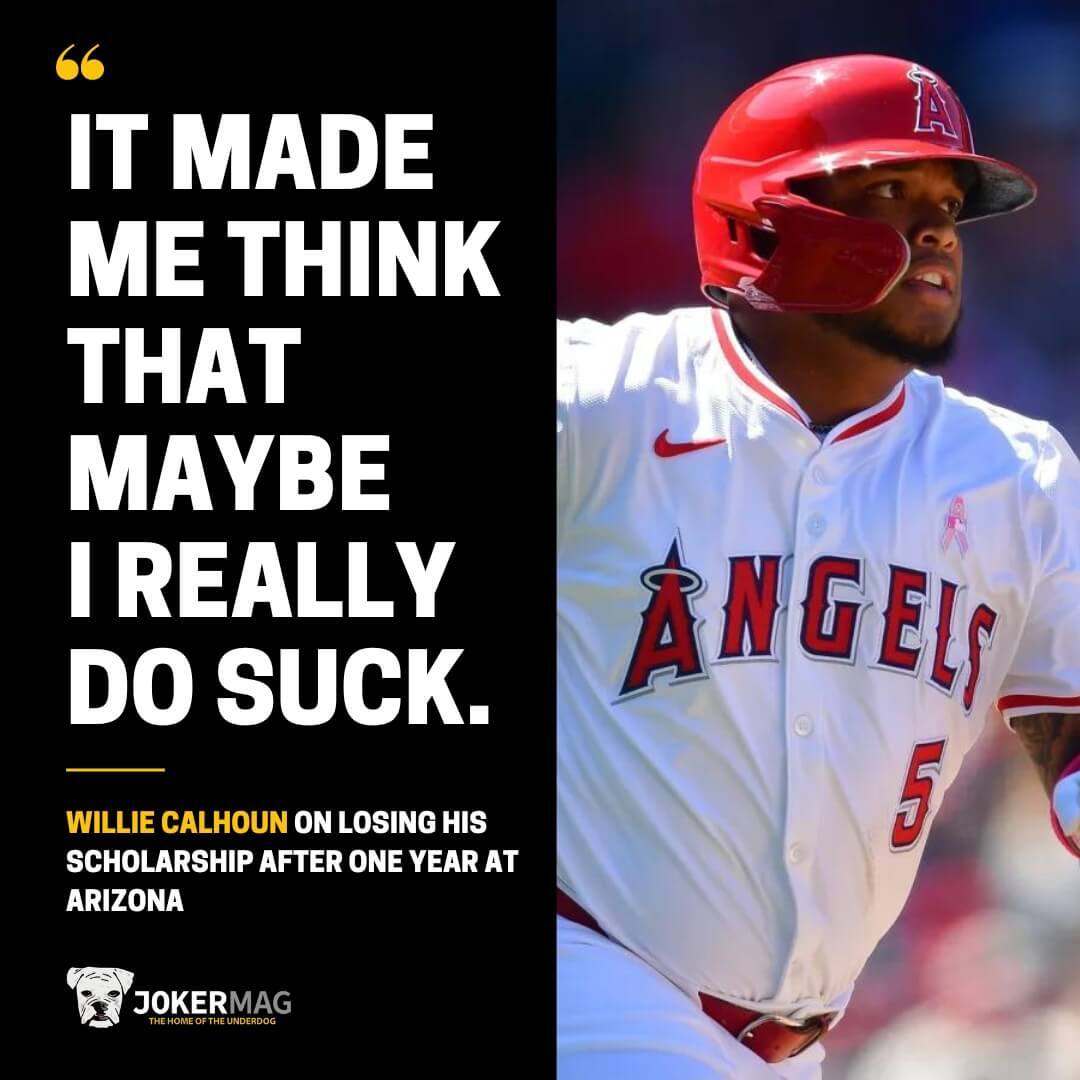Happy Sunday! 🐶
Quick question for you:
Do you like reading the featured story in the email itself OR do you prefer to click the link to read it on the Joker Mag site (or save it for later)?
Which do you prefer?
Thanks for your feedback! Your input helps me make The Underdog Newsletter better.
In today’s edition: how a trip to death row kept a big league dream alive.
If it never happened, he might’ve quit baseball for good.
Let’s dive in 👇
UNDERDOG TRIVIA 🤔
On this day in 1934: radio executive George Richards paid $7,952 to buy the Portsmouth Spartans and rebranded them to what current NFL team?
Just click the choice you think & the correct answer will be shown.
How a Trip to Death Row Kept Willie Calhoun's MLB Dream Alive
No time to read now? Click here to save it for later.
There he was. San Quentin State Prison.
Home to the largest death row facility in the United States. Housing the most dangerous and violent offenders in the nation.
The stories were true. It was terrifying.
As he followed the guard, an apple flew from above and cracked him in the head. The inmates roared with laughter.
Yup. After these eight hours, life would never be the same.
Willie Calhoun grew up in Vallejo, California – a 51-minute drive from San Francisco.
As a kid, he gravitated to all the popular sports. But his size made it hard to envision a future in any of them.
"Back in high school, I was probably like 5'5" [and] 140 pounds," he told Jared Sandler in a 2020 interview.
Realizing he couldn't realistically compete in Varsity football, he started taking baseball seriously as a junior.
He idolized Barry Bonds and tried to emulate his sweet left-handed swing.
Yet, at every level, Willie heard the same critiques:
Too small
Too slow
No power
But his performance at the plate usually silenced the doubters.
"I've always been the type of guy that wanted to prove people wrong."
When other kids were going out to parties and homecoming dances, Willie stayed home. He took swings in the backyard until his hands bled.
Across three seasons of Varsity baseball, he hit .435 with a combined 11 homers.
The Tampa Bay Rays selected him in the 17th round of the 2013 MLB Draft. But Willie chose to honor his commitment to the University of Arizona instead.
By the following spring, he realized he made a horrible mistake.
"I was probably one of the worst players," he said.
In 146 Division 1 at-bats, Willie hit just .247 with zero homers.
By December of his sophomore year, he'd lost his athletic scholarship and was academically dismissed from the school.
"I thought I let everyone down," he said.
He started believing what the critics told him and considered quitting baseball altogether.
“It made me think that maybe I really do suck."
Feeling like he was out of options, he went to his father who worked as a corrections officer at San Quentin.
"I was getting ready to fill out job applications," Willie said.
So he figured, why not follow in Dad's footsteps? Maybe a career in law enforcement was his best bet.
"I'm done with baseball," he thought to himself. "I just got cut by a college, there's no way I'm gonna go play. Where else am I gonna play?"
His father agreed to take him on a tour of the prison, where he spoke with death row inmates and life-long criminals.
"There are murderers in there, there are rapists in there, there's child molesters, kidnappers...there's everything you can think of in there," Willie said.
"I got to talk to about 10 of 'em face-to-face. They're just wired differently in there."
Willie and his dad spent a full day touring the maximum security prison, from the early morning until the late afternoon.
“I wanted him to see the uglier side of life and what that had to offer,” his dad said.
“I wanted him to hear what they’d do for another chance. I wanted him to keep pushing. You can always get a job, but I didn’t want him to give up on his dream.”
From behind bars, a convicted killer urged Willie to always do the right thing.
Another told him to hug his parents and never come back there.
Willie called it "the most eye-opening experience" of his life.
"From that day on, I said, 'Alright, I need to work as hard as I can to try to get drafted and make it to the big leagues.'"
Over winter break, his friend Chandler called him, trying to convince Willie to transfer to Yavapai – a public community college an hour outside of Phoenix.
"I would've been done [if Chandler hadn't called me]."
Willie rejected him about three times before he finally gave in.
Three days before the spring semester started, he swallowed his pride and transferred to Yavapai College.
"My life flipped upside down within that whole winter break...[until then], I thought my baseball stuff was done for good."
That spring, he put together one of the most dominant seasons in JUCO baseball history, leading the nation with 31 homers in 63 games.
His home run total equaled only that of Bryce Harper's incredible run at the College of Southern Nevada.
"Teams would come to the field like, ‘Who’s the guy that has all the homers? Wait, that little guy? There’s no way!’"
Later that summer, the Dodgers drafted Willie in the fourth round of the draft.
He ripped through three levels of the minors that same year and made his MLB debut not long after.
Today, he's an 8-year big league veteran and one of the shortest players in baseball. For him, it's a badge of honor.
"I hear stuff that I supposedly can’t do and inside my head, I’m laughing. I want to prove people shouldn’t look over me.”
That's exactly what Willie Calhoun has done.
And if it weren't for that trip to prison, he wouldn't be where he is today.
🐶
Today’s story was written by yours truly. If you know a friend who’d appreciate it, why not share it with them?
A quick break in the action for a word from this week’s sponsor:
Elevate Your Everyday and Experience the Dealmaker Pants Luxurious Comfort
Tired of compromising style for comfort, and vice versa? The Dealmaker Pant shatters the status quo. Crafted with meticulous attention to detail and featuring innovative design elements, these pants redefine what it means to dress for success. Invest in a pair, and experience the difference for yourself. Save 15% with code READ15, exclusive to {{publication_name}} readers.
Thank you for supporting our sponsors! They help me keep The Underdog Newsletter free ♡
What did you think of today’s edition?
Instead of voting on a poll, just hit reply and shoot me your thoughts.
I love getting replies and feedback straight from you. Plus they help tell your email provider that you want to get The Underdog Newsletter each week :)
Til next time,
Tyler

Extra Innings…
👀 In case you missed it: This viral sensation inspires millions with his innovative pursuit of a near-impossible dream. As one reader said: “How can you not root for this person!”
💪 Doctors gave him a 1-in-a-million chance to ever feed himself again. Now Aaron Baker is turning adversity into adventure. This story gave me the chills.
⚾️ After coming back from hip surgery, this 12-year-old girl is hitting .521 and crushing 265-foot homers.
🔥 Because you made it this far: Watch this O’s fan catch a 108 mph foul ball bare-handed!
Love The Underdog Newsletter? Here are three ways you can help our stories inspire more people:
Tell a friend or family member to subscribe ($0)
Snag some Underdog Mentality merchandise ($12+)
Make a one-time donation & become an Underdog MVP for life ($1+)




